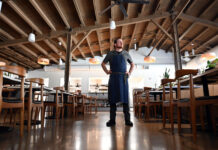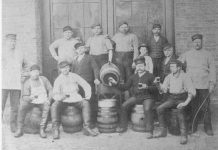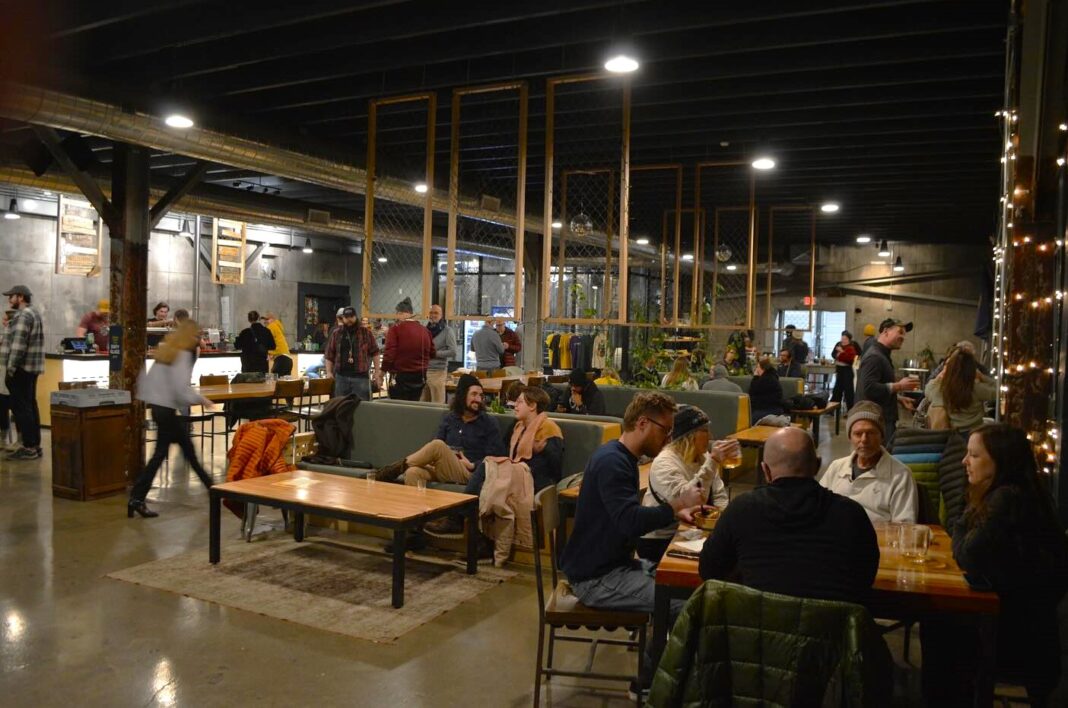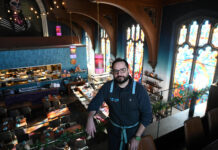The Winter 2024 (Vol. 84) issue of Food & Dining Magazine is now available in all the familiar places: Louisville area eateries and food shops, newsstands and online. Subscribe to our award-winning print publication and have it delivered to your door each issue.
Last fall I was delighted to be given the assignment of profiling Trellis Brewing Co. (827 Logan St.), primarily because I’d heard just enough about the start-up to know that founders Kyle Jahn and Ryan Reed were planning on approaching beer and brewing from an angle that was simultaneously oblique (compared with prevailing norms) and quite traditional.
So it has been. Given that the format of a “column” openly incorporates the writer’s opinion, kindly indulge me when I say that the beers at Trellis are delicious, and just about everything associated with the brewery’s chosen method of operation testifies to the qualities that attracted many of us to “craft” brewing in the first place.
I’m too old to get excited, but Trellis is an exception. Craft beers there don’t taste like most of the others because they’re designed to be different. Read the article at issuu and learn why; meanwhile, here are excerpts.
In 1517, noted Saxon beer drinker and occasional theologian Martin Luther went rummaged through his sacristy for a hammer and nails, then posted “95 Theses” on the church door in Wittenberg. Only a few centuries later, Kyle Jahn and Ryan Reed, aspiring craft brewers in Louisville, reduced the number of theses to just one, online – but it’s a doozy.
“90% of breweries have the exact same design for their brewing equipment and those designs don’t allow for processes like step mashing or decoction. Is it any wonder why most craft beer tastes the same?”
This breathtaking challenge to the established order in contemporary craft beer is as audacious as any of Luther’s propositions amid the 16th century spiritual sphere.
And…
Basic “hedonic” elements have become bizarrely under-valued in craft beer – and yes, “hedonic” refers to the prioritization of pleasure. Beer should be pleasing, right? Yet, how do we define pleasure? The culinary world offers useful parallels, among them the “Maillard reaction,” or chemical reactions to heat while cooking that produce heightened sensory experiences: complexity, flavors, aromas and colors. There’s also umami, the fifth basic taste, Japanese for “delicious savoriness.”
So, how might a brewery enhance the pleasure quotient in a glass of beer, not by reinventing brewery science, but re-emphasizing certain components to create “beermami”? The founders of Trellis already answered their own question: Through “processes like step mashing or decoction.”
—
We’ve established previously that Donum Dei Brewing’s owner Rick Otey brews and distills on-site at 3211 Grant Line Rd. in New Albany, maintaining that beer and spirits are gifts from God, hence the Latinate names.
His annual barrel-aged Drunken Unicorn release combines both house functions. In 2024, 8th Dei Pizza (previously 8th Street Pizza) commenced operations inside Donum Dei’s taproom, specializing in made-to-order New York style pizza (build-your-own or signature pies), cheesy bread and garlic or pepperoni breadsticks.
On Sunday, February 2, Donum Dei will host its 7th Annual Chili Cookoff, as local chefs and chili enthusiasts compete for the coveted title of Chili Champion. The roster of competitors has been completed, and on the day of the show guests can taste their entries, vote for their favorite, and contribute to Apron Inc.’s ongoing efforts.
APRON Inc. was created in 2011 to help provide financial relief to food and beverage industry workers in the Louisville, Kentucky metropolitan area who find themselves in need during times of crises. Since the COVID-19 pandemic, APRON Inc. has stepped up with a far greater volume of assistance to local workers than ever before.
At Donum Dei on Feb. 2, doors open at 12 noon. For a (suggested) donation of $20, there’ll be all-you-care-to-eat chili. All funds raised during the Chili Cookoff go directly to APRON Inc.
—
In British usage, the word boozer is roughly synonymous with the American term dive. Both can be taken to imply an old-school sort of watering hole where adult beverages can be enjoyed without bells, whistles and various other annoying intrusions (like kombucha).
To my mind, boozer and dive are honorifics, titles bestowed on an establishment by its customers and the aggregated opinion of the outside world. In short, I differ somewhat violently with headlines like this: “New dive bar/boozer opens tomorrow.”
No. These words don’t make sense together, even with Auto-Tune. A joint becomes a boozer or dive with hard-earned time, and comes to be identified as such owing to merit. Just as 98% of modern “speakeasies” as licensed to operate by civil authorities cannot logically be what they claim — apart from the dictates of vapid cosplay — a tavern fresh from the womb is not a dive just because it sells wretched High Life or PBR at bargain prices.
Sorry, latecomers, but you must earn it.
Sticky carpets, pickled eggs and pints for a fiver: why there’s life in the old-school boozer yet, by Tomé Morrissy-Swan and Matthew Pearce (The Guardian)
In the Palm Tree pub, east London, barman Alf is taking only cash at the rattling 1960s till. The building, which is Grade II-listed, stands in the middle of Mile End Park, and Alf has worked here since 1976. “It’s a wonderful pub,” he says. It is also ranked fifth in Time Out’s 50 Best Pubs in London list, published this month, and marks a clear preference that has emerged for traditional boozers.
Previously at “Hip Hops”:
Hip Hops: Jimmy Carter’s homebrewing heroics, the state of the “craft” biz, and #PubJanuary




















 Roger Baylor is an entrepreneur, educator, and innovator with
Roger Baylor is an entrepreneur, educator, and innovator with 




